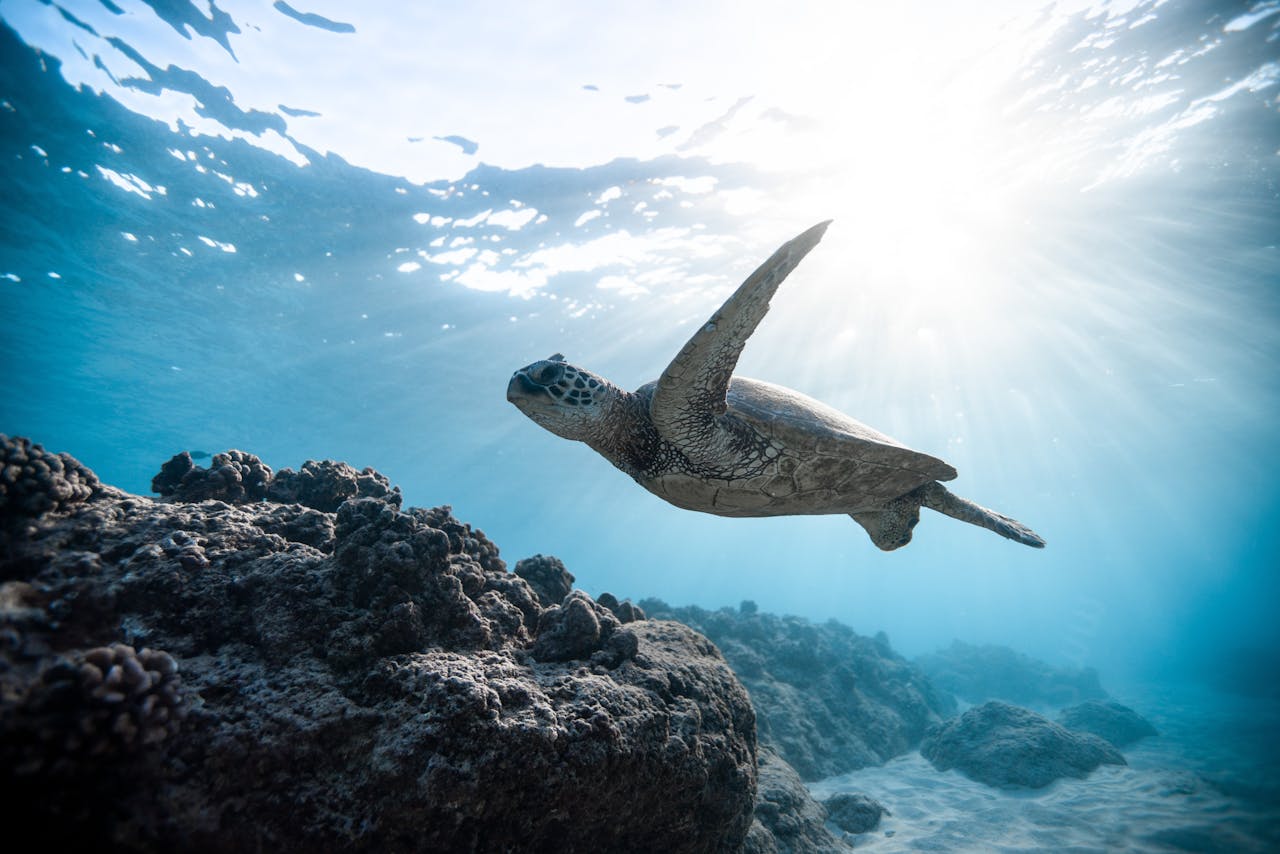Every year on the 8th June, people around the world come together to celebrate World Ocean Day – a global reminder of just how vital our oceans are and why we must act now to protect them. Covering over 70% of the Earth’s surface, oceans are more than just a beautiful backdrop for beach holidays and outdoor adventures; they are the lifeblood of our planet, and without them, life on Earth would be impossible.
Why are oceans so important?
Oceans produce at least 50% of the Earth’s oxygen, regulate our climate and absorb roughly 30% of the carbon dioxide we produce. They are home to millions of species, many of which are still undiscovered. From microscopic plankton to the majestic blue whale, marine life plays a key role in the health of our planet. But it doesn’t stop there. Oceans provide jobs, food and joy for billions of people. Whether you’re a sailor, surfer, swimmer, seafood lover, or just someone who enjoys the sound of lapping waves, the ocean touches all our lives more than we realise.
What is World Ocean Day?
World Ocean Day began in 1992 at the Earth Summit in Rio de Janeiro and was officially recognised by the United Nations in 2008. Its goal is to raise global awareness of the threats facing our oceans and to inspire collective action to safeguard them for future generations. Each year, this day brings together communities, conservation groups, schools, brands and individuals with a common mission: to protect and celebrate our shared oceans.
Why do our oceans need protecting?
Unfortunately, our oceans are under serious threat. Plastic pollution, overfishing, habitat destruction and climate change are pushing marine ecosystems to the brink. Every minute, the equivalent of a bin lorry’s worth of plastic enters the ocean. Coral reefs – home to a quarter of all marine life – are bleaching due to rising ocean temperatures. Overfishing has left many species dangerously depleted. If we don’t take action now, all this damage could be irreversible.
How can you help?
The good news is that every action counts. Here’s how you can make a difference:
● Reduce plastic use: say no to single-use plastics. Carry a reusable water bottle, a bag for life, a coffee cup and other everyday items to limit the amount of waste ending up in the sea.
● Choose sustainable seafood: look for certified sustainable options and avoid overfished species.
● Get involved: join a beach clean-up, support marine conservation groups or attend World Ocean Day events.
● Spread the word: raise awareness by educating your friends and family or sharing a related social media post. A simple share can inspire change.
● Vote with your wallet: support businesses that prioritise sustainability and ocean health.
Cool Ocean Facts
● More people have been to space than to the Mariana Trench (the deepest part of the ocean). Approximately 500 people have been to space, but only 27 have been to the bottom of the Mariana Trench (7 miles deep).
● 94% of the planet’s wildlife is found in the oceans.
● The blue whale is the largest animal on Earth, weighing up to 200 tonnes, with a heart the size of a car and veins so large, humans could swim up them! The blue whale can be found in every ocean.
● About 80% of the world’s oceans remain unexplored. Scientists believe there could potentially be millions of underwater species yet to be discovered.
Grangers' commitment to our Oceans
Just like the hills, valleys, moorland and forests on land, the oceans, seas, lakes and rivers are nature’s playground and should be protected. Grangers is committed to safeguarding our waters, promoting sustainable and eco credentials that help us do our bit for the ocean. This extensive list includes the kind of plastic we use in our product bottles. All of our solutions are housed in 100% recyclable, Prevented Ocean Plastic bottles. This means that our bottles are made from plastic that would have otherwise ended up as waste in the ocean. Additionally, there are various ways to reuse your Grangers bottle.
- Refill – either use our reduced plastic Eco Refill Pouches to fill up your bottles or stop by your local outdoor shop to make use of our Refill Stations.
- Return – return your bottles to us using our freepost address so we can use them again!
Not only is Grangers’ packaging sustainable, but so are our solutions. All our cleaning and waterproofing formulations are water-based, PFC- and PFAS-free and biodegradable, meaning they break down in our waterways and don’t cause any environmental harm.
This World Ocean Day, take a moment to think about how much the ocean gives us - and what we can give back. As you can see, our oceans are vital and there are still plenty of ocean-related benefits that we haven’t discovered yet. Whether you’re hiking a coastal trail, paddling through mangroves or just enjoying the sea breeze, remember: a healthier ocean means a healthier world. Let’s protect our blue planet, and together, we can make waves of change.
To learn more about World Ocean Day and how you can get involved, click here: https://worldoceanday.org/.




Share:
The Grangers Spotlight: 3 Dads Walking
Be Prepared: Top Safety Tips for Navigating the Great Outdoors